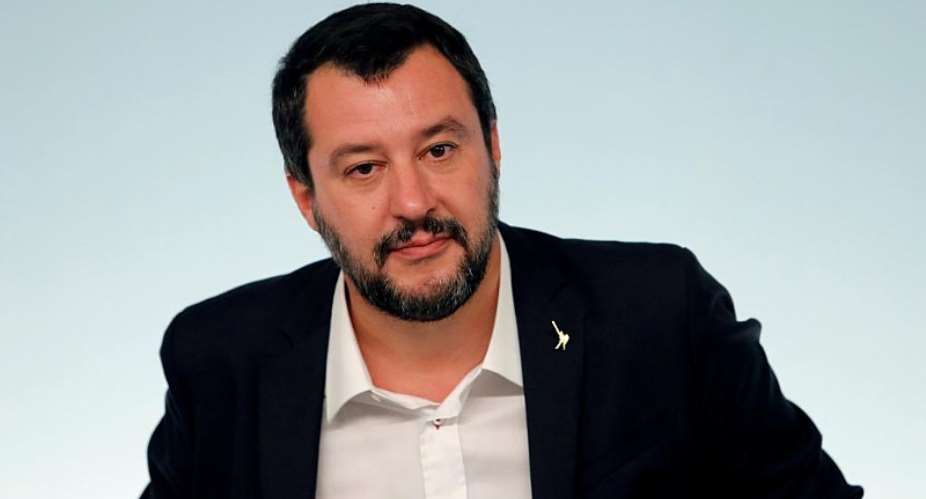Italian interior minister Matteo Salvini, a vocal critic of illegal immigration and the European Union's asylum policies, welcomed 51 East African refugees arriving by plane from Niger on Wednesday. Salvini said Italy's doors were open to refugees arriving by legal channels, but asylum seekers' situations are not so simple.
The refugees are mostly women and children from Ethiopia, Eritrea, Somalia and Sudan.
Officials helping them say the adults have experienced torture and genital mutilation and that many have already attempted the treacherous journey across the Mediterranean Sea before landing in Libyan detention centres.
They were among some 2000 people evacuated from Libya with the help of the United Nations High Commission for Refugees (UNHCR) and brought to Niamey in Niger, where their cases were processed in order to send them to Western countries.
“This is part of the operation that we launched a year ago to evacuate vulnerable refugees from Libya, to provide them with a safe country from which to start their lives again,” explains Carlotta Sami, UNHCR spokesperson for Southern Europe.
“France has received almost 300 of such refugees. There were other flights to Italy in late 2017 and early 2018, and this is the first flight since the inception of the new government.”
In welcoming their arrival, Salvini sought to situate their arrival in his government's hard line on illegal immigration.
“It shows that Italy is a welcoming country of generosity and solidarity, where I have been entrusted to bring a bit of order and calm to a phenomenon that has surpassed us these past years,” Salvini said, in reference to the hundreds of thousands of undocumented migrants and refugees that have arrived in Italy since 2015.
“The only way for women and children in difficulty to arrive is by plane, not in rafts run by criminals who smuggle human beings to buy weapons.”
Escape from smugglers and detention centres
For people fleeing violence in their home countries, the transfer system represents a way out of reliance on smugglers to get to safety, although getting host countries in Europe and elsewhere on board is not always a straightforward task.
“This is a durable solution that ensures protection and dignity to these individuals,” says Carlotta Sami.
“We struggle to convince European countries that opening stronger, wider, more consolidated safe and legal ways to asylum would help in stopping the smugglers' networks.”
Transfers are also a way out of the Libyan detention centres where asylum seekers end up after being detained.
“At the moment in Libya, evacuation is the only way out of the country,” says Giulia Tranchina, a human rights lawyer based in London.
“You cannot cross the desert backwards, you cannot take a boat because you will be deported back and detained again.”
Hypocrisy
The number of arrivals of migrants and refugees to Italy has fallen sharply since summer 2017, first due to deals between Libyan officials and the previous government, and then by Salvini's decision in June to close Italy's ports to humanitarian rescue ships.
However, some observers of migration from Africa to Europe say these decisions have displaced the hardships facing asylum seekers to the Libyan detention centres.
“This project [of the UNHCR] is crucial, but the problem is that European governments cannot hide behind these tiny numbers of evacuated refugees,” says Tranchina.
Salvini praised the conditions of centres after a visit to Libya in June, but the UNHCR responded saying they were sites of inhuman conditions including torture and other rights abuses.
Tranchina suggests Salvini's welcoming of 51 people should thus be seen in light of his cooperation with the Libyan authorities should be brought to light here.
“It's hypocritical and frankly really insulting, considering the fact that he went to Libya and had the gall to claim the detention centres are luxurious,” she says.
“People are killing themselves, burning themselves alive, hanging themselves in detention centres for how bad the situations is, and migrants are dying of starvation once they land in Italy because of the way they've suffered in Libya.”





 Dumsor: Mathew Opoku Prempeh has been disrespectful, he should be fired – IES
Dumsor: Mathew Opoku Prempeh has been disrespectful, he should be fired – IES
 NPP prioritizing politics over power crisis solution — PR Strategist
NPP prioritizing politics over power crisis solution — PR Strategist
 E/R: Gory accidents kills 3 persons at Aseseaso, several others critically injur...
E/R: Gory accidents kills 3 persons at Aseseaso, several others critically injur...
 Nobody can come up with 'dumsor' timetable except Energy Minister – Osafo-Maafo
Nobody can come up with 'dumsor' timetable except Energy Minister – Osafo-Maafo
 Dumsor: You ‘the men’ find it difficult to draw timetable when ‘incompetent’ NDC...
Dumsor: You ‘the men’ find it difficult to draw timetable when ‘incompetent’ NDC...
 We’re working to restore supply after heavy rains caused outages in parts of Gre...
We’re working to restore supply after heavy rains caused outages in parts of Gre...
 NPP government plans to expand rail network to every region — Peter Amewu
NPP government plans to expand rail network to every region — Peter Amewu
 Dumsor must stop vigil part 2: We’ll choose how we demonstrate and who to partne...
Dumsor must stop vigil part 2: We’ll choose how we demonstrate and who to partne...
 2024 elections: NDC stands on the side of morality, truth; NPP isn't an option —...
2024 elections: NDC stands on the side of morality, truth; NPP isn't an option —...
 Akufo-Addo has moved Ghana from 'Beyond Aid' to ‘Beyond Borrowing’ — Haruna Idri...
Akufo-Addo has moved Ghana from 'Beyond Aid' to ‘Beyond Borrowing’ — Haruna Idri...
